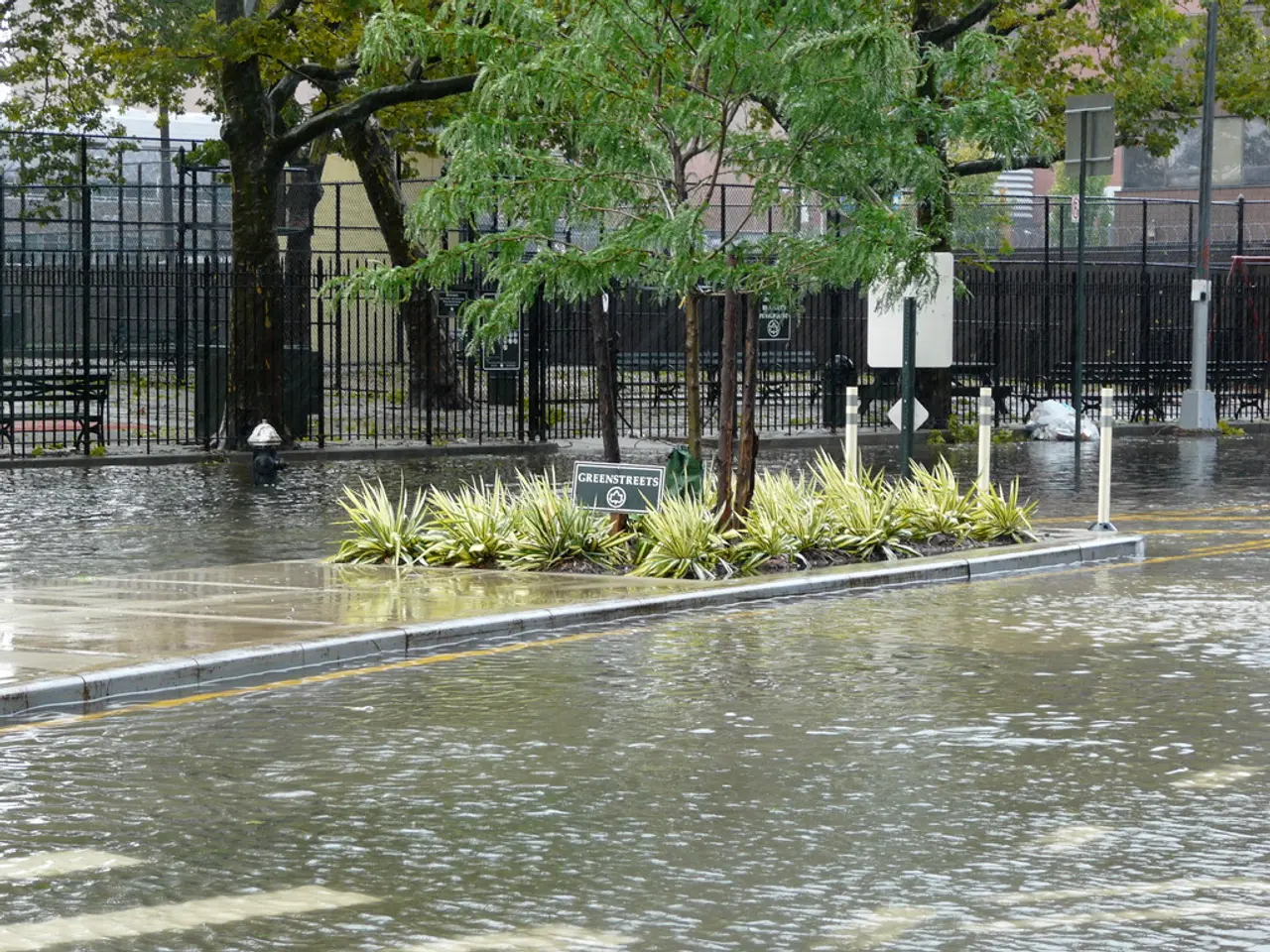Renewable energy sources and their impact on energy stability: an analysis.
Take a Sip of Stability: Navigating the Energy Security Minefield
Amid the tense standoff between Iran and Israel, the world is once more confronted with the thorny issue of energy security. This time, it's not just about the Middle East's nuclear ambitions or Israel's military might; it's about the lifeblood of modern economies — energy.
The Strait of Hormuz, a narrow waterway that serves as a lifeline for global energy supplies, is under the threat of closure by Iran. Such an action would disrupt access to fossil fuels for countries worldwide and potentially send energy prices skyrocketing. Approximately 20% of the world's liquefied natural gas and nearly 27% of its crude oil glide through this strategic passage, connecting the Persian Gulf to the Gulf of Oman.
Threats to energy security are no laughing matter, as the world learned in the 1970s when oil exports were disrupted, culminating in long lines at gas stations, crippling economies, and an energy crisis that still echoes today. More recently, the European energy vulnerability due to its reliance on imported Russian gas, following President Vladimir Putin's invasion of Ukraine, underscored the need for reliable energy sources.
The escalating reliance on oil imports, especially in an era of unstable global trade and escalating geopolitical tensions, creates numerous energy security risks. As per experts at the UK-based energy think tank Ember, 79% of the world's population lives in oil-importing countries, with 62 nations depending entirely on foreign sources for their oil needs. Over 90 nations, including Spain, South Korea, Germany, Turkey, and India, rely on imports for over 80% of their needs.
In the face of these risks, renewable energy presents a promising, stable, and secure alternative. By harnessing power within the borders of a country or in neighboring regions, renewables can shield against the price volatility and geopolitical risks associated with fossil fuels. According to research from the International Monetary Fund, over the past few decades, most fossil-fuel producing countries have become more politically risky and exhibit less democratic freedom.
"The more we have home-grown energy sources, the better," emphasizes Fatih Birol, executive director of the International Energy Agency, reinforcing the importance of securing energy from multiple sources and routes, rather than relying on a single nation, corridor, or company. The European Union has heeded this message, rapidly expanding its home-grown renewable energy to meet 47% of its electricity needs in response to the energy crisis following Russia's invasion of Ukraine.
However, the transition to clean energy isn't without its challenges. Renewables are reliant on specific weather conditions, and any shortfall can lead to instability in the electrical grid. Spain's recent nationwide power outage raised concerns about the stability of renewable energy sources like solar and wind. The government, however, has since attributed the outage to planning issues and technical faults, denying that an excess of renewables played a role.
There are also concerns about the potential import dependency for metals and minerals needed to build renewable infrastructure and storage. But experts say a shortage of transition materials wouldn't create an energy crisis like it would in the case of fossil fuels, as they are only needed for expanded capacity rather than ongoing power generation. Additionally, serious environmental pollution has been reported in communities near mines for metals such as nickel, which is crucial for electric vehicle batteries. Stricter regulations on waste management, improved monitoring, and introducing cleaner technologies for extraction are seen as ways to mitigate the impact of mining.
Enrichment Data:The importance of energy security lies in its critical role in ensuring economic stability, national security, and environmental sustainability. Energy security means having reliable access to affordable and accessible energy resources, which is essential for powering economies, supporting industries, and maintaining essential services like hospitals and education. With the global economy heavily dependent on oil imports, energy security becomes particularly vital. Dependence on oil imports exposes countries to several risks:
- Economic Vulnerability: Fluctuations in global oil prices can cause price shocks that disrupt industrial operations and economic growth. Countries dependent on imports are vulnerable to sudden price increases or supply interruptions.
- Supply Disruptions: Geopolitical tensions, conflicts, or natural disasters in oil-producing regions can lead to supply shortages. This threatens the continuous availability of energy and can impact national security.
- Dependence and Strategic Risks: Heavy reliance on a limited number of suppliers or regions for oil can constrain a country’s strategic autonomy and increase susceptibility to external pressures.
Beyond immediate supply concerns, energy insecurity affects social and developmental outcomes. Lack of access to reliable and affordable energy hinders healthcare, education, job creation, and the ability to cope with climate change impacts, especially in vulnerable regions. Therefore, ensuring energy security by diversifying energy sources, Improving infrastructure, and investing in sustainable energy systems is crucial for reducing vulnerability to oil import risks and for supporting stable, resilient economies and societies.
- The ongoing conflict between Iran and Israel highlights the critical importance of energy security in today's interconnected world.
- The Strait of Hormuz, a vital energy corridor for world supply, is in danger of shutdown by Iran, which can potentially surge energy prices and disrupt fossil fuel access for countries globally.
- The 1970s oil disruptions demonstrated the detrimental effects of energy insecurity, as long lines at gas stations, crippled economies, and an enduring energy crisis ensued.
- Europe's energy vulnerability due to dependence on imported Russian gas following President Vladimir Putin's invasion of Ukraine underscores the need for secure and reliable energy sources.
- The escalating reliance on oil imports in a period of unstable global trade and geopolitical tensions creates energy security risks for a majority of the world's population living in oil-importing countries.
- With the increasing risks of fossil fuels, renewable energy is seen as a stable and secure alternative, shielding countries from geopolitical risks and price volatility associated with fossil fuels.
- As the European Union swiftly expands homegrown renewable energy to meet 47% of its electricity needs in response to the energy crisis, there is a growing emphasis on diversifying energy sources to secure energy from multiple sources and routes rather than relying on a single nation or company.




